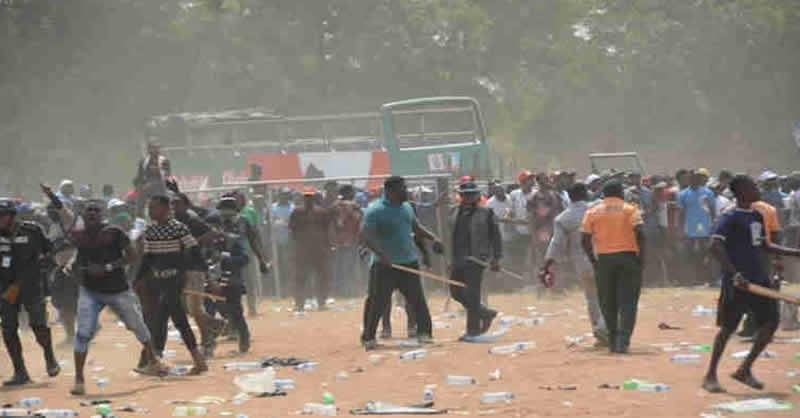By
Ola Olateju
Ogbeni Rauf Aregbesola’s recent declaration that members of the African Democratic Congress (ADC) cannot be intimidated should echo across Nigeria like a battle cry. It is more than a partisan statement. It is a warning to all of us that democracy is in danger, and that the ruling All Progressives Congress (APC) has chosen the path of violence, not service.

If APC had truly delivered on its promises of security, jobs, good roads, affordable food, and dignity for Nigerians, it would not need to unleash thugs on opposition members. A party that performs does not fear competition. A government that governs well does not silence voices. Thuggery is the language of failure, the desperate tool of leaders who have nothing left to offer.
The Dangerous Road We’ve Been Down Before
This culture of intimidation is not new in Nigerian politics. From the rigged elections of 1964 and the Western Region crisis of 1965 when the “Wild-Wild West” burnt in the flames of electoral malpracticeto the militarized violence of the Abacha era, Nigeria has too often witnessed leaders who resort to coercion when legitimacy fails. APC’s conduct in the Southwest today echoes those dark chapters. It is portraying the image of a ruling party seeking to secure its survival not by ballots, but by blood and fear.
The parallels are striking. During General Sani Abacha’s dictatorship in the 1990s, the state became a machinery of violence, silencing opposition figures like Chief Alfred Rewane,Shehu Musa Yar Adua, Ken Saro-Wiwa, Kudirat Abiola and countless activists. The world condemned Nigeria as a pariah state. Similarly, under apartheid South Africa, the ruling minority tried to entrench itself in power through brutality, detentions, and suppression of dissent. Despite decades of violence, the spirit of the people triumphed.Ghana too lived through years of authoritarianism until the tide of democracy finally swept in, ushering in a culture of competitive elections and relative stability. History teaches us that no regime of intimidation lasts forever. The will of the People will once awakened, always overcome tyranny.APC’s violence in the Southwest today is a dangerous replay of these old tragedies. It is not about ordinary political contest.It is about whether Nigeria will remain a democracy or slide into one-party authoritarianism.
This Is Kakistocracy, Not Democracy
What APC is practicing is not democracy. It is kakistocracy. Government by the worst elements of society. A ruling party that cannot campaign on achievements, but instead unleashes thugs on its opponents, is telling Nigerians in plain language that it has failed. Yet it insists on ruling, not by ballots, but by blood. This is not governance. This is barbarism.
The irony is painful. A party that once campaigned on the promise of “change” now embodies the very rot it claimed to fight. By normalizing political violence, APC is delegitimizing the democratic project itself and alienating citizens who should find hope in the ballot box.
The People’s Power Is Greater
Here is the truth of what APC fears most. It is the rising profile of ADC among the Nigerian people. The people are stronger. As Ogbeni Rauf Aregbesola rightly emphasized, ADC members are not cowards, and neither should the Nigerian people be. The ballot is the weapon of resistance; the thumbprint is stronger than the gun when wielded in unity. The Sabuwar Tafiya philosophy which is the journey of renewal, courage, and people-driven governance is the path forward. It is time for Nigerians to resist intimidation, not with stones or fists, but with our thumbs. The power of resistance lies in the unity of the people at the ballot box.
This struggle is not just about the ADC or any single party. It is about whether Nigerians can freely choose their leaders without fear. Every citizen must realize that silence in the face of oppression is complicity. If thuggery is tolerated today, it will become normalized tomorrow, and democracy itself will be a casualty.
The World Must Not Look Away
The international community must also open its eyes. Nigeria cannot be allowed to descend into another era of fear and bloodshed. Just as the world stood with South Africans against apartheid, and just as it condemned Abacha’s Nigeria, it must now stand with Nigerians who are struggling to keep their democracy alive. Silence will only embolden those who believe power is theirs to keep forever, no matter the cost in human lives.
International observers, civil society organizations, and global democratic institutions must be prepared to call out and sanction acts of political violence. Nigeria is too strategic for Africa and the world to ignore. A nation of over 200 million people sliding into authoritarianism would destabilize the region and extinguish hope for democracy on the continent.
On a final note, this is the hour of decision for us as Nigerians. We must ask ourselves whether we want to be ruled forever by fear and thuggery, or we will rise with courage and reclaim our democracy. History has revealed to us that oppression never lasts. But freedom does not come to the timid. It comes to the resolute.
Let us rise. Let us resist. Let us show APC that Nigeria belongs to the people, not to thugs. With our thumbs, with our unity, and with our courage, we can break the chains of intimidation and reclaim the promise of democracy.
OLATEJU LECTURES AT THE ACHIEVERS UNIVERSITY, OWO

